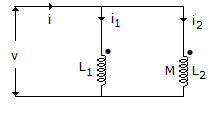Question

a.
A
b.
B
c.
C
d.
D
Posted under Electronics and Communication Engineering
Interact with the Community - Share Your Thoughts
Uncertain About the Answer? Seek Clarification Here.
Understand the Explanation? Include it Here.
Q. For the circuit of figure
Similar Questions
Explore Relevant Multiple Choice Questions (MCQs)
Q. Figure shows the V-i characteristics of a material. The material is likely to be
View solution
Q. In the circuit shown in the given figure, power dissipated in the 5 Ω resistor is
View solution
Q. Consider the network graph shown in the figure which one of the following is NOT a 'tree' of graph
View solution
Q. In figure, the current I is
View solution
Q. Figure shows the variation of Z(ω) for a positive real function. The function is
View solution
Q. For the time domain response shown in figure the pole
View solution
Q. In a series RLC circuit, the resonant frequency is ω0 the fractional frequency deviation is defined as
View solution
Q. The transfer function V2/V1 for figure has
View solution
Q. A two branch parallel resonant circuit has a coil of resistance R and inductance L, in one branch and a capacitors C in the other branch. The source voltage is V, At resonance the circulating current is
View solution
Q. The following equation where v1, v2 ... vb are the instantaneous branch voltages and i1, i2 ... ib are the instantaneous branch currents pertains to
View solution
Q. Transient current in an RLC circuit is oscillatory when
View solution
Q. For the star network of figure, the equivalent delta network is
View solution
Q. In f(t) = δ(t - T), F(s) =
View solution
Q. The following transfer function represents
View solution
Q. The reading of the voltmeter V in figure should be __________ volt.
View solution
Q. In figure, i = Im sin ωt. If v = 0, ω =
View solution
Q. In a series RLC circuit for lower frequency power factor is __________ .
View solution
Q. The transfer function H(s) of a system is given by following equation. Given that understeady state conditions, the sinusoidal I/P and 0/P are respectively x(t) = cos 2t and y(t) = cos (2t + Φ), then the angle Φ will be
View solution
Q. Which of the following is an I.S.I. symbol of cut-out power?
View solution
Q. If Fourier transform of f(t) is F(jω), then which pairs of time functions and Fourier transforms are matched. Select the answer using the following codes
View solution
Recommended Subjects
Are you eager to expand your knowledge beyond Electronics and Communication Engineering? We've handpicked a range of related categories that you might find intriguing.
Click on the categories below to discover a wealth of MCQs and enrich your understanding of various subjects. Happy exploring!








